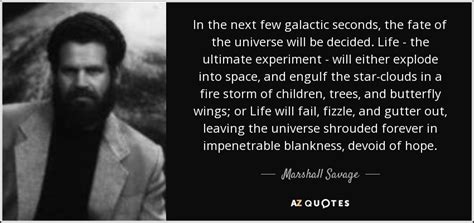A Quote by Paul Davies
If we knew we were not alone in the universe it would have a very, very deep impact on our worldview, on our understanding of our place in the universe.
Related Quotes
The human mind has a desire to know its place in the universe and the role we play in the tapestry of life. This is actually hardwired into our brains, the desire the know our relationship to the universe. This was good for our evolution, since it enabled us to see our relationship to others and to nature which was good for our survival. And it is also what drives our curiosity to understand the universe.
In the annals of science fiction, where dystopias rule the imaginative roost, Star Trek stood nearly alone in telling us that our future would be better than our past, that our common problems would be solved, that we, as a species, were fundamentally good, and that the universe would reward us for our goodness.
If we deny our awesome challenge; turn our backs on the living universe, and forsake our cosmic destiny, we will commit a crime of unutterable magnitude. Mankind alone has the power to carry out this fundamental change in the universe. Our failure would lead to consequences unthinkable. This is perhaps the first and only chance the universe will ever have to awaken from its long night and live. We are the caretakers of this delicate spark of Life. To let it flicker and die through ignorance, neglect, or lack of imagination is a horror too great to contemplate.
Wisdom is not just knowing fundamental truths, if these are unconnected with the guidance of life or with a perspective on its meaning. If the deep truths physicists describe about the origin and functioning of the universe have little practical import and do not change our picture of the meaning of the universe and our place within it, then knowing them would not count as wisdom.
There are two questions that get to us all: Are we alone in the Universe? And, where did we come from? For me, science provides a much more satisfactory way to seek answers than does any religion I've come across. With that said, the universe is mysterious and wonderful. It fills me with reverence for nature and our place among the stars; our place in space.
Our greatest theoretical physicist, Stephen Hawking, recently declared that humans have no more than a hundred years to get off this planet to ensure the survival of our species. And when someone such as he does so, it is with an understanding not just of the science, but of both our tenuous place and our possibility in the universe.
A successful unification of quantum theory and relativity would necessarily be a theory of the universe as a whole. It would tell us, as Aristotle and Newton did before, what space and time are, what the cosmos is, what things are made of, and what kind of laws those things obey. Such a theory will bring about a radical shift - a revolution - in our understanding of what nature is. It must also have wide repercussions, and will likely bring about, or contribute to, a shift in our understanding of ourselves and our relationship to the rest of the universe.
I realized that most white Americans knew very little about our history and our struggle, and were having difficulty understanding the basis for our agitation and our resistance and our complaints. I also discovered that while black Americans had a sense of the beauty and tragedy of the journey from the time of slavery until now, we were not rooted in the specifics. I thought one way to familiarize people with that history would be through the voices of the great folk artists.





































